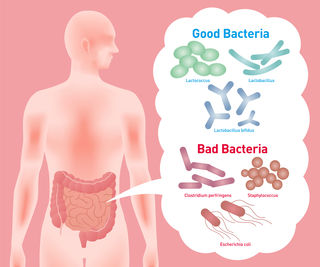Your Gut Health and Your Weight
Can your gut be the missing link in obesity?

Source: CarolynRoss/shutterstock
Researchers are beginning to understand a hidden factor in the equation: the human microbiome. Your digestive tract is home to a huge population of microorganisms that help you digest your food and extract nutrients. Normally, there is a balance of a number of different “gut bugs.” But if the proportions become imbalanced, you can develop a number of health problems.
Obesity is one of the conditions linked to changes in the microbiome. If you are overweight or obese, you are more likely to have an imbalance in gut bacteria and suffer from “leaky gut,” or damage to the intestinal wall that allows bacteria, toxins, and poorly digested proteins and fats to pass out of the intestines into the bloodstream. Together, the imbalance of microorganisms and leaky gut can cause symptoms throughout the body.
How do your gut microorganisms get out of whack? They may never have been properly balanced in the first place. If you were delivered by C-section or fed with a bottle instead of breastfed, you missed out on important chances to inherit good bacteria from your mom. For many people, obesity begins in childhood for these reasons.
In adulthood, an imbalance in gut flora may be caused by stress, or by a high-fat or high carbohydrate diet. Antibiotics are another major culprit. When we take these drugs, the abundance of “good bacteria” in the gut may be reduced by a third, and this effect can last for weeks or months, making us vulnerable to digestive and metabolic changes that can cause weight gain. In fact, livestock are often fed low doses of antibiotics so they will reach market weight more quickly. Studies in mice suggest that a high-fat diet combined with antibiotics leads to an especially high rate of obesity.
To make a long story short, gut health affects every other aspect of your well-being, including your weight. Restoring digestive health – including rebalancing gut microorganisms – can be a great help in managing obesity. Here’s how to heal your gut.
- Use antibiotics sparingly. Talk with your doctor about ways to avoid unnecessary use of antibiotics. For example, they will not cure the common cold or other conditions caused by viruses.
- Take a probiotic supplement. These can help restore a healthy balance of gut flora. Use a product that has live microorganisms and a mix of different bacteria and yeast, including Lactobacillus GG, Saccharomyces boulardii, and Bifidobacteria.
- Eat prebiotic foods. Prebiotics are nondigestible carbohydrates (usually soluble food fibers) that act as food for probiotics. The best sources of soluble food fibers are chicory root, wild yams, other root vegetables, jicama, agave, whole grains, bananas, onions, garlic, and artichokes. You can also buy prebiotics in supplement form.
- Manage your stress. You already know that daily hassles can affect your weight when they make you want to eat to soothe yourself. But stress can also change the balance of intestinal bacteria. Practicing relaxation techniques like visualization or mindfulness meditation can help.

